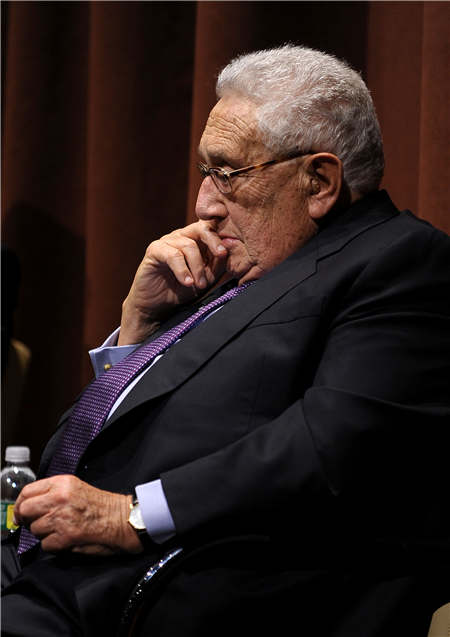 |
|
Henry Kissinger at an event in 2009 in New York. [Photo by Michael Loccisano/Getty Images] |
Despite the many biographies of Kissinger, Ferguson took up the challenge of writing about Kissinger's life and thoughts after repeated invitations by Kissinger himself.
Ferguson was first approached by Kissinger for his biography nearly 15 years ago. And he then plunged into the plentiful personal diaries, letters and unfinished manuscripts that Kissinger gave him unprecedented access to. Some of the documents dated back to the 1940s.
The two reached a legal agreement in 2004 to guarantee Ferguson's independence while writing.
In fact, according to Ferguson, on reading his manuscript, Kissinger didn't speak to him for weeks because the former statesman felt that he had revealed too much.
And it was not until the book was published and some of Kissinger's associates read it and told him what they thought of it that Kissinger resumed speaking to Ferguson.
In Ferguson's words, sometimes the life of a single person like Kissinger helps us realize exactly why history changes direction and the world is transformed.
Kissinger's life is much like a typical American story.
As a German refugee from an Orthodox Jewish family, he was sent back to Germany as an American soldier in World War II, where he met Fritz Kraemer, the man who led him into history and philosophy.
After the war, Kissinger went to Harvard University in 1947 to study political science.
His doctoral dissertation, published in 1957 with the title A World Restored: Metternich, Castlereagh and the Problems of Peace, 1812-1822, looked at European diplomacy more than a century earlier.
In Ferguson's opinion, history is the key to Kissinger's ability to understand the contemporary world more than any other American statesman of the last two or three generations.
Kissinger wrote in his doctoral dissertation that no significant conclusions were possible in the study of foreign affairs without an awareness of the historical context.
For him, history is both a source of illuminating analogies and the defining factor in national self-understanding. Another Kissinger's book from 1957, Nuclear Weapons and Foreign Policy, explains his idea of a limited nuclear war.
This work propelled him from academic obscurity to what Americans call a public intellectual.
And then, from 1958 to 1968, Kissinger advised Nelson Rockefeller on foreign policy in three unsuccessful attempts to become the Republican candidate for the presidency.